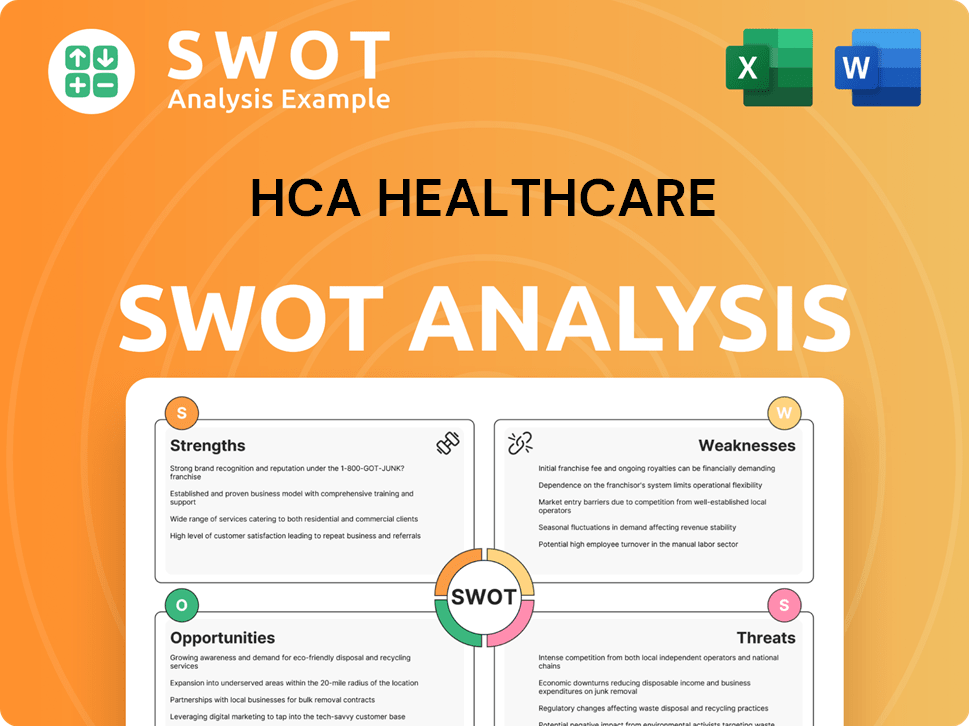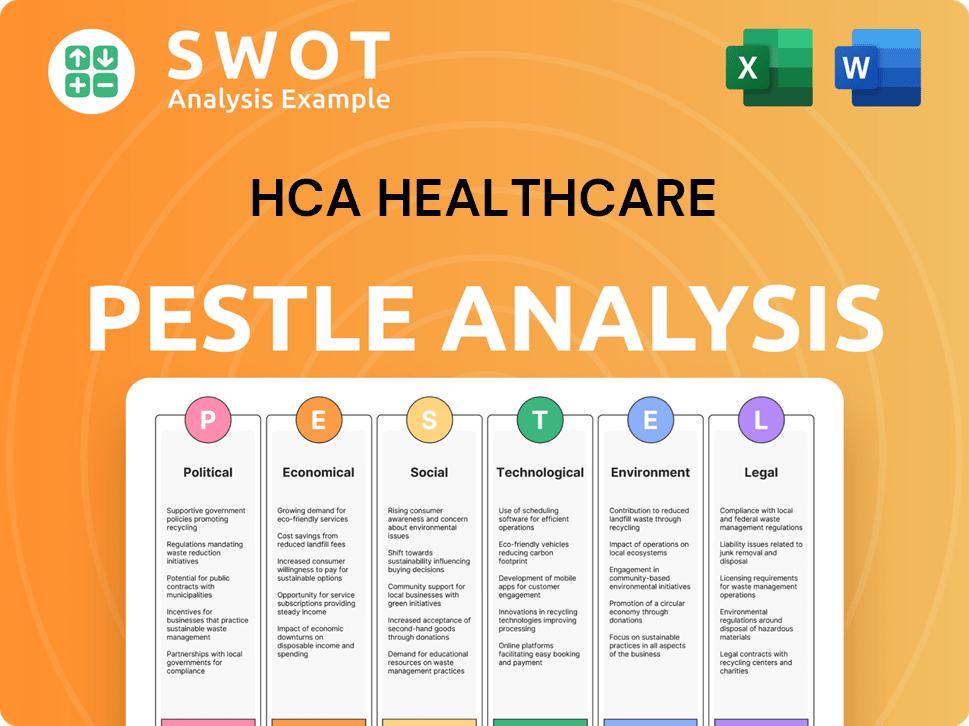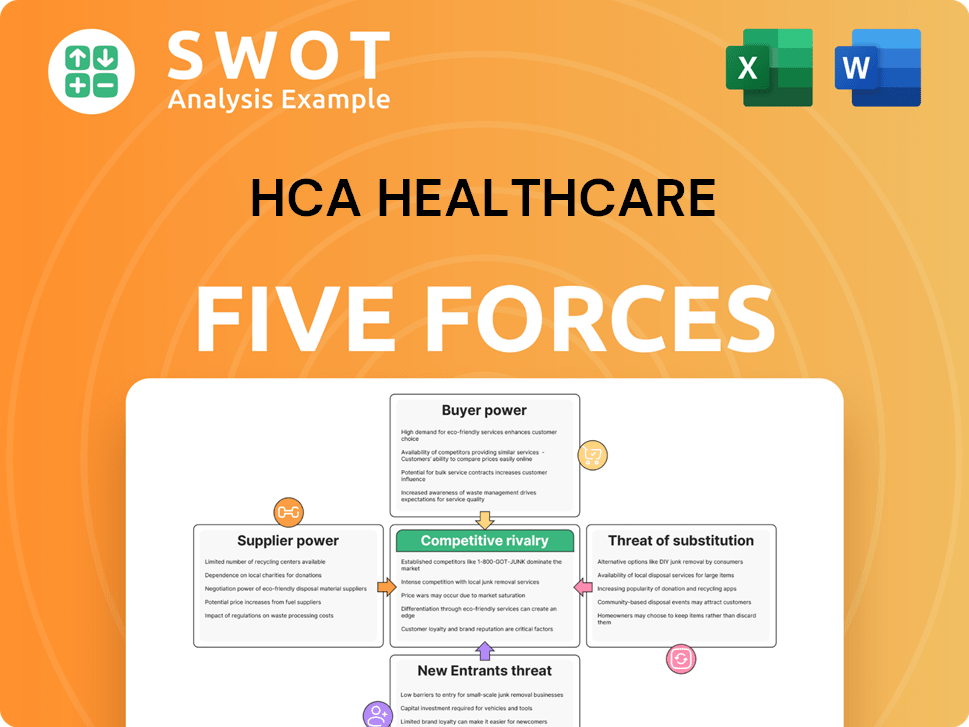HCA Healthcare Bundle
How Did HCA Healthcare Revolutionize Healthcare?
Imagine a time when healthcare was a patchwork of fragmented services, often out of reach for many. This is the backdrop against which HCA Healthcare, initially known as Hospital Corporation of America, was born in Nashville, Tennessee, in 1968. The founders of HCA Healthcare envisioned a new paradigm, one focused on efficiency, quality, and accessibility through a network of well-managed hospitals. From its inception, the HCA Healthcare SWOT Analysis reveals a journey of strategic adaptation.

The HCA history reveals how this HCA company has become a dominant force in the healthcare industry. Today, HCA Healthcare provides comprehensive services including hospital, emergency room, and outpatient care, as well as diagnostic and laboratory services. Exploring the HCA Healthcare founding and its subsequent HCA Healthcare growth, we'll uncover key milestones and the evolution of its business model, demonstrating its profound impact on the sector.
What is the HCA Healthcare Founding Story?
The story of HCA Healthcare, a leading force in the healthcare industry, begins on July 1, 1968. This pivotal date marks the founding of what would become one of the largest healthcare providers in the United States. The company's inception was driven by a vision to transform the hospital sector through innovative management and operational strategies.
The founders, Dr. Thomas F. Frist Sr., Dr. Thomas F. Frist Jr., and Jack C. Massey, brought a unique blend of medical expertise, business acumen, and financial prowess to the table. Their combined skills set the stage for a new approach to healthcare, focusing on efficiency and quality. This approach was a significant departure from the traditional methods of hospital management.
The founders saw an opportunity to improve the healthcare landscape by applying business principles to hospital management. This vision led to the creation of Hospital Corporation of America (HCA), aiming to centralize operations and improve patient care. The company's initial strategy focused on acquiring and managing hospitals, implementing standardized practices to enhance efficiency and service quality.
HCA Healthcare was founded in 1968 by Dr. Thomas F. Frist Sr., Dr. Thomas F. Frist Jr., and Jack C. Massey.
- Dr. Thomas F. Frist Sr., an internist, provided medical insight.
- Dr. Thomas F. Frist Jr., a physician, contributed business knowledge.
- Jack C. Massey, a successful entrepreneur, offered financial and management expertise.
- The initial focus was on acquiring and managing hospitals to improve efficiency and patient care.
The founders recognized that hospitals were often inefficiently managed. They aimed to apply sound business principles to healthcare, a novel concept at the time. Initial funding came from personal capital and strategic investments, leveraging their reputations to attract early support. The late 1960s saw rising demand for healthcare and a need for better management, influencing the company's creation.
The early strategy of HCA Healthcare focused on acquiring and managing hospitals, applying standardized operational practices, and leveraging economies of scale. This approach aimed to improve both profitability and the quality of services. The company's early success was built on its ability to enhance efficiency and deliver better care. The company's headquarters is located in Nashville, Tennessee.
The early business model of HCA Healthcare involved acquiring and managing hospitals. This model emphasized standardized operational practices and leveraging economies of scale. Their initial offering was comprehensive hospital management and care delivery. An interesting anecdote surrounding the company's inception involves the founders' belief that hospitals, despite their critical role, were often run inefficiently compared to other businesses. They sought to apply sound business principles to healthcare, a novel concept at the time. Initial funding for HCA Healthcare was secured through a combination of the founders' personal capital and strategic investments, leveraging their reputations and connections to attract early support. The cultural and economic context of the late 1960s, marked by increasing demand for healthcare services and a growing recognition of the need for more sophisticated management in the industry, significantly influenced the company's creation.
The founders' vision was to create a healthcare system that was both efficient and patient-focused. This vision drove the company's initial acquisitions and management strategies. The founders' combined expertise in medicine, business, and finance was crucial to the early success of HCA Healthcare. The company's early focus on operational efficiency set the stage for its future growth and impact on the healthcare industry. The Target Market of HCA Healthcare is a key factor in its continued success.
HCA Healthcare SWOT Analysis
- Complete SWOT Breakdown
- Fully Customizable
- Editable in Excel & Word
- Professional Formatting
- Investor-Ready Format

What Drove the Early Growth of HCA Healthcare?
The early growth and expansion of HCA Healthcare, formerly known as Hospital Corporation of America, marked a pivotal phase in the company's history. Beginning in Nashville, Tennessee, HCA quickly expanded its network through strategic acquisitions and management of hospitals. This early focus demonstrated the effectiveness of its centralized management model, setting the stage for its future growth within the healthcare industry. The company's initial team expanded rapidly to support the growing network of facilities.
HCA Healthcare's expansion involved acquiring both large and small hospitals. This strategy allowed for the integration of various facilities into the HCA system. Standardized practices were implemented to improve efficiency and patient outcomes, a key factor in the company's early success. The company made significant acquisitions in the 1970s and 1980s.
HCA Healthcare entered new markets by identifying underserved areas and opportunities to enhance existing healthcare infrastructure. This involved geographical expansion within the United States and diversification of service offerings. Key acquisitions and mergers played a crucial role in consolidating its market position and expanding its reach. This strategy helped HCA become a dominant player.
Major capital raises, including public offerings, provided the necessary funding for the company's aggressive expansion strategy. Leadership transitions, while significant, generally maintained the core vision established by the founders. This ensured continuity in strategic direction. The market reception to HCA's model was largely positive.
The competitive landscape allowed HCA to carve out a significant niche due to its innovative approach to hospital management. These growth efforts fundamentally shaped HCA Healthcare's trajectory. This established it as a leader in the integrated healthcare delivery model. HCA Healthcare's early growth was crucial.
HCA Healthcare PESTLE Analysis
- Covers All 6 PESTLE Categories
- No Research Needed – Save Hours of Work
- Built by Experts, Trusted by Consultants
- Instant Download, Ready to Use
- 100% Editable, Fully Customizable

What are the key Milestones in HCA Healthcare history?
The brief history of the HCA Healthcare company, formerly known as Hospital Corporation of America, is marked by significant milestones in the healthcare industry. From its founding in Nashville, Tennessee, HCA has grown to become one of the largest healthcare providers globally, significantly impacting the healthcare industry. The company's journey reflects its commitment to innovation, expansion, and adapting to the evolving needs of patients and the healthcare landscape.
| Year | Milestone |
|---|---|
| 1968 | Founded in Nashville, Tennessee, by Thomas F. Frist Sr., Thomas F. Frist Jr., and Jack C. Massey, marking the beginning of HCA Healthcare. |
| 1969 | HCA Healthcare went public, becoming the first hospital company listed on the New York Stock Exchange. |
| 1970s | Rapid expansion through acquisitions, establishing a significant presence in the healthcare market and growing its hospital network. |
| 1980s | Continued growth and diversification, including the introduction of new healthcare services and technologies. |
| 1990s | HCA Healthcare underwent significant restructuring, including a leveraged buyout and subsequent public offering. |
| 2000s | Focus on enhancing patient care, expanding its network, and investing in advanced medical technologies. |
| 2010s | Continued expansion and strategic partnerships, reinforcing its position as a leading healthcare provider. |
| 2024 | HCA Healthcare reported significant investments in technology and infrastructure to enhance patient care and operational efficiency. |
HCA Healthcare has consistently been at the forefront of medical innovation. The company has adopted advanced medical technologies and integrated electronic health records systems across its facilities to improve patient care coordination and efficiency. Major partnerships with academic institutions and other healthcare providers have further cemented its position as a leader in medical innovation and education.
HCA Healthcare was an early adopter of advanced medical technologies. This includes diagnostic tools, surgical equipment, and patient monitoring systems, enhancing the quality of care.
The implementation of integrated electronic health records (EHR) systems across its facilities has improved patient care coordination. This has led to better data management and streamlined workflows.
HCA Healthcare consistently invests in research and development. This investment has led to advancements in various medical specialties, including cardiology, oncology, and surgery.
Strategic partnerships with academic institutions and other healthcare providers have been crucial. These collaborations have facilitated innovation and knowledge sharing within the healthcare industry.
HCA Healthcare has received recognition for its quality of care and patient safety initiatives. The company's commitment to patient safety has been a key focus.
HCA Healthcare has expanded its telehealth services to improve access to care. Telehealth services have become increasingly important, especially in remote areas.
HCA Healthcare, like other major players in the healthcare industry, has faced several challenges. These include market downturns, evolving regulatory landscapes, and intense competition. The company has also addressed issues such as rising healthcare costs, staffing shortages, and the complexities of healthcare reform. For more details on their business model, you can read about the Revenue Streams & Business Model of HCA Healthcare.
HCA Healthcare has addressed the challenge of rising healthcare costs. The company has implemented cost-saving measures and efficiency improvements to manage expenses.
The healthcare industry faces staffing shortages, and HCA Healthcare is no exception. The company has implemented strategies to recruit and retain healthcare professionals.
Navigating the evolving regulatory landscape is a constant challenge for HCA Healthcare. The company must adapt to new healthcare laws and policies.
HCA Healthcare operates in a competitive market and faces challenges from other healthcare providers. The company focuses on differentiating its services.
Healthcare reform and its impact on the industry pose ongoing challenges. HCA Healthcare adapts its strategies to align with healthcare reform.
Economic downturns can impact healthcare utilization and financial performance. HCA Healthcare has demonstrated resilience in managing through economic cycles.
HCA Healthcare Business Model Canvas
- Complete 9-Block Business Model Canvas
- Effortlessly Communicate Your Business Strategy
- Investor-Ready BMC Format
- 100% Editable and Customizable
- Clear and Structured Layout

What is the Timeline of Key Events for HCA Healthcare?
The HCA Healthcare, formerly known as Hospital Corporation of America, has a rich HCA history. The company's journey began in Nashville, Tennessee, and has since grown into one of the largest healthcare providers in the United States. This HCA company has significantly impacted the healthcare industry.
| Year | Key Event |
|---|---|
| 1968 | HCA Healthcare was founded by Thomas F. Frist Sr., Thomas F. Frist Jr., and Jack C. Massey. |
| 1969 | The company went public, marking a significant step in its early growth. |
| 1970s | HCA Healthcare expanded rapidly through acquisitions, becoming a major player in the hospital industry. |
| 1980s | The company faced financial challenges but continued to grow its network of hospitals. |
| 1990s | HCA Healthcare went through restructuring and strategic shifts. |
| 2000s | The company focused on improving its operational efficiency and expanding its services. |
| 2010s-2020s | HCA Healthcare continued to grow, investing in technology and expanding its reach across the United States and the United Kingdom. |
HCA Healthcare is expected to continue its strategy of strategic acquisitions and expansions. This includes both organic growth and acquiring other healthcare facilities. The company's focus on expanding its geographic footprint remains a key priority for future growth. This approach supports its mission to provide quality care.
Investing in cutting-edge technology is crucial for HCA Healthcare. This includes implementing advanced electronic health records (EHR) systems and telehealth services. The company aims to enhance patient care and improve operational efficiency through technological integration. Such investments are vital for maintaining a competitive edge in the healthcare industry.
HCA Healthcare is expected to maintain a strong financial position. The company's ability to generate revenue and manage costs will be critical. The company's stock performance and overall market position are influenced by its financial health. For more detailed insights, you can explore the history of the company here: HCA Healthcare's journey.
Changes in healthcare regulations and policies can significantly impact HCA Healthcare. The company must navigate evolving regulations, including those related to patient care, data privacy, and reimbursement models. Adapting to these changes will be essential for sustained growth and success in the healthcare industry.
HCA Healthcare Porter's Five Forces Analysis
- Covers All 5 Competitive Forces in Detail
- Structured for Consultants, Students, and Founders
- 100% Editable in Microsoft Word & Excel
- Instant Digital Download – Use Immediately
- Compatible with Mac & PC – Fully Unlocked

Related Blogs
- What is Competitive Landscape of HCA Healthcare Company?
- What is Growth Strategy and Future Prospects of HCA Healthcare Company?
- How Does HCA Healthcare Company Work?
- What is Sales and Marketing Strategy of HCA Healthcare Company?
- What is Brief History of HCA Healthcare Company?
- Who Owns HCA Healthcare Company?
- What is Customer Demographics and Target Market of HCA Healthcare Company?
Disclaimer
All information, articles, and product details provided on this website are for general informational and educational purposes only. We do not claim any ownership over, nor do we intend to infringe upon, any trademarks, copyrights, logos, brand names, or other intellectual property mentioned or depicted on this site. Such intellectual property remains the property of its respective owners, and any references here are made solely for identification or informational purposes, without implying any affiliation, endorsement, or partnership.
We make no representations or warranties, express or implied, regarding the accuracy, completeness, or suitability of any content or products presented. Nothing on this website should be construed as legal, tax, investment, financial, medical, or other professional advice. In addition, no part of this site—including articles or product references—constitutes a solicitation, recommendation, endorsement, advertisement, or offer to buy or sell any securities, franchises, or other financial instruments, particularly in jurisdictions where such activity would be unlawful.
All content is of a general nature and may not address the specific circumstances of any individual or entity. It is not a substitute for professional advice or services. Any actions you take based on the information provided here are strictly at your own risk. You accept full responsibility for any decisions or outcomes arising from your use of this website and agree to release us from any liability in connection with your use of, or reliance upon, the content or products found herein.